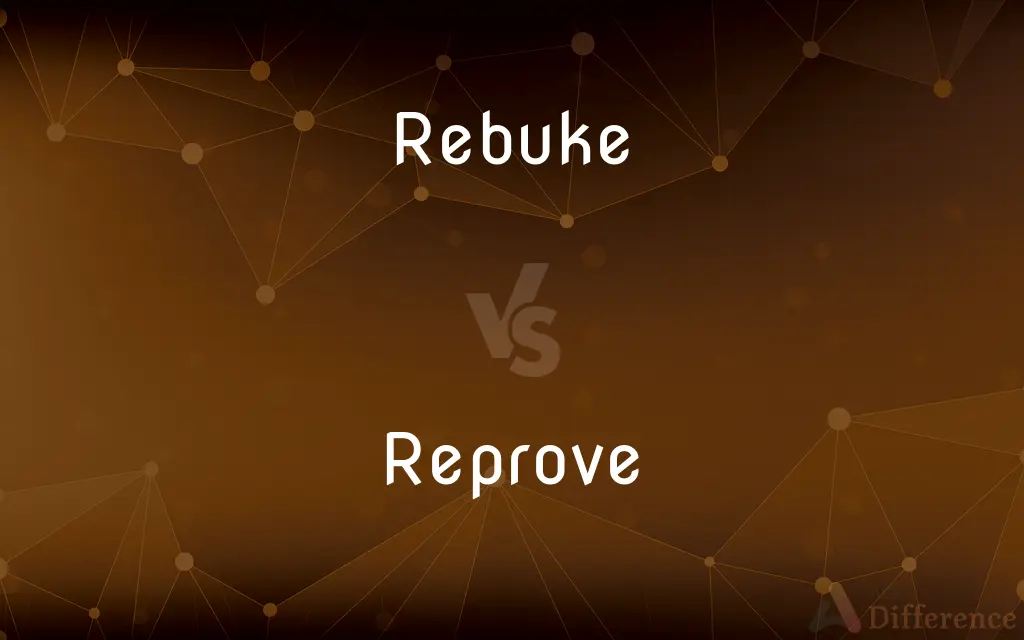Rebuke vs. Reprove — What's the Difference?
Edited by Tayyaba Rehman — By Fiza Rafique — Updated on April 4, 2024
A rebuke is a sharp, often public criticism, while a reprove implies a gentler, more private correction.

Difference Between Rebuke and Reprove
Table of Contents
ADVERTISEMENT
Key Differences
A rebuke is a strong and often public expression of disapproval, typically directed at someone due to their actions or behavior. It carries a connotation of sharpness and severity, intended to correct or deter undesirable actions. On the other hand, to reprove is to criticize or correct someone, usually in a more private setting. The aim of reproving is more about guidance and correction, focusing on the improvement of the individual rather than just condemning their actions.
While a rebuke might be delivered in the heat of the moment and can be emotional or personal, a reprove tends to be more measured and thoughtful, with an emphasis on learning and growth. Whereas a rebuke might be seen as punitive, a reprove is often viewed as constructive criticism. This distinction highlights the different contexts in which each might be used; rebukes are common in situations requiring immediate censure, while reproves are suited to environments where personal development is encouraged.
In the realm of personal relationships, a rebuke can strain ties, as it often leaves the recipient feeling attacked or belittled. Conversely, a reprove, being gentler and usually private, is more likely to be received as intended – as advice or correction given out of concern for the recipient’s well-being. This difference underlines the importance of the manner and setting in which feedback is given.
The choice between rebuking and reproving can reflect the nature of authority or relationship between the parties involved. Authoritative figures may resort to rebuking to assert control or reestablish norms swiftly. In contrast, mentors or peers might choose to reprove, emphasizing mutual respect and the desire for positive change.
The distinction also extends to the aftermath of the interaction. A rebuke, due to its severity, may result in embarrassment or resentment, potentially hindering future communication. A reprove, however, is more likely to foster an environment of open dialogue and personal growth, strengthening the relationship between the involved parties.
ADVERTISEMENT
Comparison Chart
Definition
A sharp, often public criticism.
A gentler, more private correction.
Intention
To express disapproval or deter actions.
To guide or correct towards improvement.
Tone
Typically harsh and direct.
More measured and constructive.
Setting
Often public or in the presence of others.
Usually private or in a one-on-one setting.
Outcome
Can strain relationships or communication.
Aims to foster understanding and growth.
Compare with Definitions
Rebuke
A reprimand or chastisement for inappropriate behavior.
The senator faced a rebuke from the party for his controversial statements.
Reprove
Expressing disapproval in a way that is meant to instruct, not punish.
He was reproved for his mistake, but it was done in a manner that emphasized learning.
Rebuke
A statement or action expressing strong disapproval.
The teacher's rebuke for cheating was meant to uphold academic integrity.
Reprove
A private admonishment aimed at personal growth.
In a private meeting, she was reproved for her lack of punctuality.
Rebuke
An act of speaking in a critical manner to someone.
His rebuke of the new policy was unexpected and sparked debate.
Reprove
An act of offering corrective feedback to encourage improvement.
The coach reproved the player's technique, offering detailed advice for improvement.
Rebuke
An expression of sharp disapproval or criticism.
The manager's rebuke for the missed deadline was harsh and public.
Reprove
The act of gently correcting without causing embarrassment.
His friend reproved him for his insensitive comment, ensuring the lesson was learned without public humiliation.
Rebuke
A corrective measure intended to deter certain behaviors.
The public rebuke served as a warning to others in the organization.
Reprove
To criticize or correct someone gently and privately.
The mentor reproved the young writer for her sloppy editing in a constructive manner.
Rebuke
In English law and the canon law of the Church of England, a rebuke is a censure on a member of the clergy. It is the least severe censure available against clergy of the Church of England, less severe than a monition.
Reprove
To express disapproval to (someone); criticize
Reproved the children for making too much noise.
Rebuke
To criticize (someone) sharply; reprimand.
Reprove
To express disapproval about (something)
"Some bigger boys laughed. But Augustine angrily reproved their frivolity" (Richard Hughes).
Rebuke
To express sharp criticism regarding (an act, for example)
"a series of sweeping decisions that rebuked the investigators' presumptions" (Donald A. Ritchie).
Reprove
(intransitive) to express disapproval.
Rebuke
(Obsolete) To check or repress.
Reprove
(transitive) to criticise, rebuke or reprimand (someone), usually in a gentle and kind tone.
Rebuke
An expression of strong disapproval.
Reprove
(transitive) to deny or reject (a feeling, behaviour, action etc.).
Rebuke
(of a person) A harsh criticism.
Reprove
(transitive) To prove again.
Rebuke
(of a person) To criticise harshly; to reprove.
Reprove
To convince.
When he is come, he will reprove the world of sin, and of righteousness, and of judgment.
Rebuke
To check, silence, or put down, with reproof; to restrain by expression of disapprobation; to reprehend sharply and summarily; to chide; to reprove; to admonish.
The proud he tamed, the penitent he cheered,Nor to rebuke the rich offender feared.
Reprove
To disprove; to refute.
Reprove my allegation, if you can.
Rebuke
A direct and pointed reproof; a reprimand; also, chastisement; punishment.
For thy sake I have suffered rebuke.
Why bear you these rebukes and answer not?
Reprove
To chide to the face as blameworthy; to accuse as guilty; to censure.
What if thy son
Prove disobedient, and, reproved, retort,"Wherefore didst thou beget me?"
Rebuke
Check; rebuff.
Reprove
To express disapprobation of; as, to reprove faults.
He neither reproved the ordinance of John, neither plainly condemned the fastings of the other men.
Rebuke
An act or expression of criticism and censure;
He had to take the rebuke with a smile on his face
Reprove
Take to task;
He admonished the child for his bad behavior
Rebuke
Censure severely or angrily;
The mother scolded the child for entering a stranger's car
The deputy ragged the Prime Minister
The customer dressed down the waiter for bringing cold soup
Common Curiosities
Can a rebuke be constructive?
While a rebuke is primarily critical, it can have a constructive intent by deterring negative behavior.
Is reprove always done in private?
Typically, yes, to maintain the individual’s dignity and focus on improvement rather than punishment.
What might provoke a rebuke?
Serious misconduct or errors, especially those affecting others or violating norms, might provoke a rebuke.
How does reprove differ from rebuke?
Reprove is gentler and often private, focusing on correction, while rebuke is sharper and may be public, focusing on criticism.
Can reprove be considered a form of feedback?
Yes, reprove can be seen as constructive feedback aimed at personal or professional growth.
Does a rebuke affect the relationship between the parties involved?
It can, especially if perceived as too harsh or unjust, potentially damaging trust and respect.
What does it mean to rebuke someone?
To rebuke someone means to sharply criticize or express strong disapproval of their actions.
Why would someone choose to reprove rather than rebuke?
They might prefer a more gentle approach to correction, aiming to encourage improvement without causing harm or embarrassment.
How should one respond to a reprove?
With openness to correction and a willingness to improve, recognizing it as an opportunity for growth.
Is it possible to reprove someone without causing offense?
Yes, by focusing on the behavior rather than the person and offering constructive advice, offense can be minimized.
Can public figures receive rebukes?
Yes, public figures can be rebuked, often publicly, for actions or statements deemed inappropriate or harmful.
How do cultures vary in their use of rebuke and reprove?
Cultural norms influence how direct or gentle criticism is expressed, with some cultures preferring more indirect forms of reprove.
How does one decide whether to rebuke or reprove?
The decision depends on the relationship, the seriousness of the issue, and the desired outcome, balancing correction with respect and care.
Can rebuke be a motivator?
While it can motivate change by highlighting the seriousness of a fault, it may also demotivate if perceived as overly critical.
Is reprove less serious than rebuke?
In terms of severity and tone, yes; reprove is milder and focuses on correction rather than punishment.
Share Your Discovery

Previous Comparison
Heed vs. Weed
Next Comparison
Unfriend vs. DefriendAuthor Spotlight
Written by
Fiza RafiqueFiza Rafique is a skilled content writer at AskDifference.com, where she meticulously refines and enhances written pieces. Drawing from her vast editorial expertise, Fiza ensures clarity, accuracy, and precision in every article. Passionate about language, she continually seeks to elevate the quality of content for readers worldwide.
Edited by
Tayyaba RehmanTayyaba Rehman is a distinguished writer, currently serving as a primary contributor to askdifference.com. As a researcher in semantics and etymology, Tayyaba's passion for the complexity of languages and their distinctions has found a perfect home on the platform. Tayyaba delves into the intricacies of language, distinguishing between commonly confused words and phrases, thereby providing clarity for readers worldwide.















































